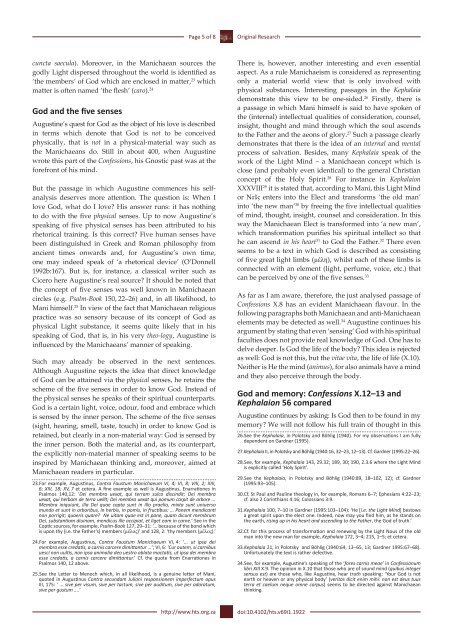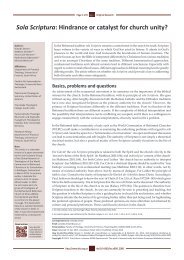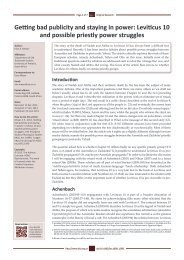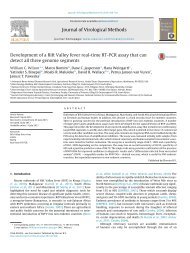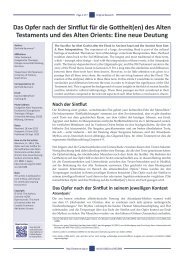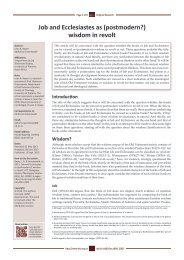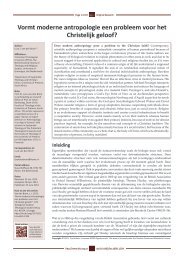A Manichaean analysis of Augustine's Confessions, Book X - HTS ...
A Manichaean analysis of Augustine's Confessions, Book X - HTS ...
A Manichaean analysis of Augustine's Confessions, Book X - HTS ...
You also want an ePaper? Increase the reach of your titles
YUMPU automatically turns print PDFs into web optimized ePapers that Google loves.
Page 5 <strong>of</strong> 8<br />
Original Research<br />
cuncta saecula). Moreover, in the <strong>Manichaean</strong> sources the<br />
godly Light dispersed throughout the world is identified as<br />
‘the members’ <strong>of</strong> God which are enclosed in matter, 23 which<br />
matter is <strong>of</strong>ten named ‘the flesh’ (caro). 24<br />
God and the five senses<br />
Augustine’s quest for God as the object <strong>of</strong> his love is described<br />
in terms which denote that God is not to be conceived<br />
physically, that is not in a physical-material way such as<br />
the <strong>Manichaean</strong>s do. Still in about 400, when Augustine<br />
wrote this part <strong>of</strong> the <strong>Confessions</strong>, his Gnostic past was at the<br />
forefront <strong>of</strong> his mind.<br />
But the passage in which Augustine commences his self<strong>analysis</strong><br />
deserves more attention. The question is: When I<br />
love God, what do I love? His answer runs: it has nothing<br />
to do with the five physical senses. Up to now Augustine’s<br />
speaking <strong>of</strong> five physical senses has been attributed to his<br />
rhetorical training. Is this correct? Five human senses have<br />
been distinguished in Greek and Roman philosophy from<br />
ancient times onwards and, for Augustine’s own time,<br />
one may indeed speak <strong>of</strong> ‘a rhetorical device’ (O’Donnell<br />
1992b:167). But is, for instance, a classical writer such as<br />
Cicero here Augustine’s real source? It should be noted that<br />
the concept <strong>of</strong> five senses was well known in <strong>Manichaean</strong><br />
circles (e.g. Psalm-<strong>Book</strong> 150, 22–26) and, in all likelihood, to<br />
Mani himself. 25 In view <strong>of</strong> the fact that <strong>Manichaean</strong> religious<br />
practice was so sensory because <strong>of</strong> its concept <strong>of</strong> God as<br />
physical Light substance, it seems quite likely that in his<br />
speaking <strong>of</strong> God, that is, in his very theo-logy, Augustine is<br />
influenced by the <strong>Manichaean</strong>s’ manner <strong>of</strong> speaking.<br />
Such may already be observed in the next sentences.<br />
Although Augustine rejects the idea that direct knowledge<br />
<strong>of</strong> God can be attained via the physical senses, he retains the<br />
scheme <strong>of</strong> the five senses in order to know God. Instead <strong>of</strong><br />
the physical senses he speaks <strong>of</strong> their spiritual counterparts.<br />
God is a certain light, voice, odour, food and embrace which<br />
is sensed by the inner person. The scheme <strong>of</strong> the five senses<br />
(sight, hearing, smell, taste, touch) in order to know God is<br />
retained, but clearly in a non-material way: God is sensed by<br />
the inner person. Both the material and, as its counterpart,<br />
the explicitly non-material manner <strong>of</strong> speaking seems to be<br />
inspired by <strong>Manichaean</strong> thinking and, moreover, aimed at<br />
<strong>Manichaean</strong> readers in particular.<br />
23.For example, Augustinus, Contra Faustum Manichaeum VI, 4; VI, 8; VIII, 2; XIII,<br />
6; XIII, 18; XV, 7 et cetera. A fine example as well is Augustinus, Enarrationes in<br />
Psalmos 140,12: ‘Dei membra uexat, qui terram sulco discindit; Dei membra<br />
uexat, qui herbam de terra uellit; Dei membra uexat qui pomum carpit de arbore ...<br />
Membra iniquiunt, illa Dei quae capta sunt in illo praelio, mixta sunt uniuerso<br />
mundo et sunt in arboribus, in herbis, in pomis, in fructibus: ... Panem mendicanti<br />
non porrigit; quaeris quare? Ne uitam quae est in pane, quam dicunt membrum<br />
Dei, substantiam diuinam, mendicus ille accipiat, et liget eam in carne.’ See in the<br />
Coptic sources, for example, Psalm-<strong>Book</strong> 127, 29–31: ‘... because <strong>of</strong> the bond which<br />
is upon thy (i.e. the Father’s) members (μέλος)’ and 128, 2: ‘thy members (μέλος).’<br />
24.For example, Augustinus, Contra Faustum Manichaeum VI, 4: ‘... ut ipsa dei<br />
membra esse credatis, a carnis carcere dimittantur ...’; VI, 6: ‘Cur autem, si carnibus<br />
uesci non uultis, non ipsa animalia deo uestro oblata mactatis, ut ipsa dei membra<br />
esse credatis, a carnis carcere dimittantur.’ Cf. the quote from Enarrationes in<br />
Psalmos 140, 12 above.<br />
25.See the Letter to Menoch which, in all likelihood, is a genuine letter <strong>of</strong> Mani,<br />
quoted in Augustinus Contra secundam Juliani responsionem imperfectum opus<br />
III, 175: ‘ ... sive per visum, sive per tactum, sive per auditum, sive per odoratum,<br />
sive per gustum ....’<br />
There is, however, another interesting and even essential<br />
aspect. As a rule Manichaeism is considered as representing<br />
only a material world view that is only involved with<br />
physical substances. Interesting passages in the Kephalaia<br />
demonstrate this view to be one-sided. 26 Firstly, there is<br />
a passage in which Mani himself is said to have spoken <strong>of</strong><br />
the (internal) intellectual qualities <strong>of</strong> consideration, counsel,<br />
insight, thought and mind through which the soul ascends<br />
to the Father and the aeons <strong>of</strong> glory. 27 Such a passage clearly<br />
demonstrates that there is the idea <strong>of</strong> an internal and mental<br />
process <strong>of</strong> salvation. Besides, many Kephalaia speak <strong>of</strong> the<br />
work <strong>of</strong> the Light Mind – a <strong>Manichaean</strong> concept which is<br />
close (and probably even identical) to the general Christian<br />
concept <strong>of</strong> the Holy Spirit. 28 For instance in Kephalaion<br />
XXXVIII 29 it is stated that, according to Mani, this Light Mind<br />
or Νοῦς enters into the Elect and transforms ‘the old man’<br />
into ‘the new man’ 30 by freeing the five intellectual qualities<br />
<strong>of</strong> mind, thought, insight, counsel and consideration. In this<br />
way the <strong>Manichaean</strong> Elect is transformed into ‘a new man’,<br />
which transformation purifies his spiritual intellect so that<br />
he can ascend in his heart 31 to God the Father. 32 There even<br />
seems to be a text in which God is described as consisting<br />
<strong>of</strong> five great light limbs (μέλη), whilst each <strong>of</strong> these limbs is<br />
connected with an element (light, perfume, voice, etc.) that<br />
can be perceived by one <strong>of</strong> the five senses. 33<br />
As far as I am aware, therefore, the just analysed passage <strong>of</strong><br />
<strong>Confessions</strong> X.8 has an evident <strong>Manichaean</strong> flavour. In the<br />
following paragraphs both <strong>Manichaean</strong> and anti-<strong>Manichaean</strong><br />
elements may be detected as well. 34 Augustine continues his<br />
argument by stating that even ‘sensing’ God with his spiritual<br />
faculties does not provide real knowledge <strong>of</strong> God. One has to<br />
delve deeper. Is God the life <strong>of</strong> the body? This idea is rejected<br />
as well: God is not this, but the vitae vita, the life <strong>of</strong> life (X.10).<br />
Neither is He the mind (animus), for also animals have a mind<br />
and they also perceive through the body.<br />
God and memory: <strong>Confessions</strong> X.12–13 and<br />
Kephalaion 56 compared<br />
Augustine continues by asking: Is God then to be found in my<br />
memory? We will not follow his full train <strong>of</strong> thought in this<br />
26.See the Kephalaia, in Polotsky and Böhlig (1940). For my observations I am fully<br />
dependent on Gardner (1995).<br />
27.Kephalaia II, in Polotsky and Böhlig (1940:16, 32–23, 12–13). Cf. Gardner (1995:22–26).<br />
28.See, for example, Kephalaia 143, 29.32; 189, 30; 190, 2.3.6 where the Light Mind<br />
is explicitly called ‘Holy Spirit’.<br />
29.See the Kephalaia, in Polotsky and Böhlig (1940:89, 18–102, 12); cf. Gardner<br />
(1995:93–105).<br />
30.Cf. St Paul and Pauline theology in, for example, Romans 6–7; Ephesians 4:22−23;<br />
cf. also 2 Corinthians 4:16; Colossians 3:9.<br />
31.Kephalaia 100, 7–10 in Gardner (1995:103–104): ‘He [i.e. the Light Mind] bestows<br />
a great spirit upon the elect one. Indeed, now may you find him, as he stands on<br />
the earth, rising up in his heart and ascending to the Father, the God <strong>of</strong> truth.’<br />
32.Cf. for this process <strong>of</strong> transformation and renewing by the Light Nous <strong>of</strong> the old<br />
man into the new man for example, Kephalaia 172, 3–4; 215, 1–5; et cetera.<br />
33.Kephalaia 21, in Polotsky and Böhlig (1940:64, 13–65, 13; Gardner 1995:67–68).<br />
Unfortunately the text is rather defective.<br />
34.See, for example, Augustine’s speaking <strong>of</strong> the ‘fores carnis meae’ in Confessionum<br />
libri XIII X.9. The opinion in X.10 that those who are <strong>of</strong> sound mind (quibus integer<br />
sensus est) are those who, like Augustine, hear truth speaking: ‘Your God is not<br />
earth or heaven or any physical body’ (veritas dicit enim mihi: non est deus tuus<br />
terra et caelum neque omne corpus) seems to be directed against <strong>Manichaean</strong><br />
thinking.<br />
http://www.hts.org.za<br />
doi:10.4102/hts.v69i1.1922


